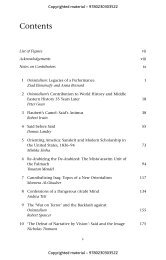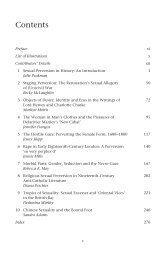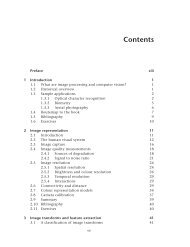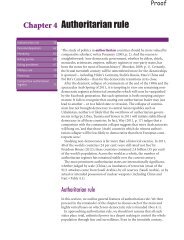The Nameless Shamelessness of Ulysses - Palgrave
The Nameless Shamelessness of Ulysses - Palgrave
The Nameless Shamelessness of Ulysses - Palgrave
You also want an ePaper? Increase the reach of your titles
YUMPU automatically turns print PDFs into web optimized ePapers that Google loves.
<strong>The</strong> ‘nameless shamelessness’ <strong>of</strong> <strong>Ulysses</strong> 41<br />
grows suddenly alarmed when she mentions his name: ‘Not so loud my<br />
name. Whatever do you think <strong>of</strong> me? Don’t give me away. Walls have ears’<br />
(15.398–399). Anxious about the possibility <strong>of</strong> being caught in a potentially<br />
scandalous position, Bloom attempts to conceal his identity behind layers<br />
<strong>of</strong> confusion and misdirection, adopting precisely the strategy that might<br />
be employed in a libel trial. Just as a jury must decide on a defamatory<br />
interpretation <strong>of</strong> a passage, so too they must also agree that the plaintiff<br />
in the case is actually the person described in the text. In suits involving<br />
non-fictional texts, this is rarely an issue, but it typically constitutes the<br />
core <strong>of</strong> an action involving films, novels or plays. In a potentially libellous<br />
passage describing Bloom’s trip to a bordello, Joyce thus evokes the<br />
mechanisms <strong>of</strong> defamation law, once again introducing the Breens and their<br />
solicitor Menton through pseudonyms and borrowed names to elude detection.<br />
Joyce already knew from Leventhal that Dr Bloom no longer lived<br />
in Dublin in 1922, but for his readers this moment would have effectively<br />
summarized one <strong>of</strong> the text’s most pressing questions: Who is the historical<br />
antecedent <strong>of</strong> Leopold Bloom? Were he real, after all, he would be the<br />
most defamed character in the text and his identification would no doubt<br />
spark a major scandal. We now recognize him as one <strong>of</strong> the few genuinely<br />
fictional characters in the book, but this moment <strong>of</strong> confusion and<br />
misdirection in ‘Circe’ both obscures his identity and promises to reveal it,<br />
sending us into a web <strong>of</strong> historical and fictional antecedents that hint at<br />
some scandalous revelation while simultaneously resisting our investigative<br />
efforts.<br />
Throughout <strong>Ulysses</strong>, Joyce deliberately and provocatively troubles the<br />
boundary between fact and fiction, thereby pitting legal and aesthetic modes<br />
<strong>of</strong> interpretation against one another in a scandalous yet creative conflict.<br />
<strong>The</strong> pleasure and the frustration <strong>of</strong> this practice is nowhere more evident<br />
than in the ‘Scylla and Charybdis’ episode, in which more real names are<br />
invoked than anywhere else in the text. As the scene opens in the National<br />
Library, we are immediately confronted with the figure <strong>of</strong> John Eglinton, the<br />
editor <strong>of</strong> Dana and a well-known man <strong>of</strong> letters. His name can be tracked<br />
through various guides, revealing details <strong>of</strong> his real and accomplished life;<br />
yet we also learn that he is not John Eglinton, that this is merely a pseudonym<br />
he had adopted (his real name was William McGee). Furthermore, he<br />
is asking Stephen Dedalus – itself a pseudonym for James Joyce in 1904 55 –<br />
about his plans to write a book comically entitled <strong>The</strong> Sorrows <strong>of</strong> Satan, the<br />
title <strong>of</strong> a wildly popular novel written by Marie Corelli – also a pseudonym<br />
for Mary MacKay, who in turn thought she was the reincarnation <strong>of</strong> William<br />
Shakespeare. As if this dizzying array <strong>of</strong> displaced names is not confusing<br />
enough, the conversation is shared by A.E., the mystically initialled name<br />
taken by the writer and spiritualist George Russell. Finally, Dedalus, feeling<br />
the ‘elder’s gall’ behind Eglinton’s question about this novel, merely smiles<br />
and thinks <strong>of</strong> a fragment from a poem written by Oliver St John Gogarty,
















